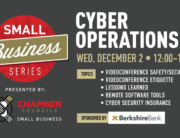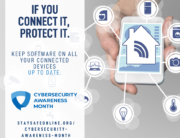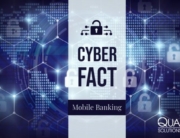Launching Your Cybersecurity Career: Insight from an Expert and an Intern
Questions and Answers with Quanterion’s Aaron Riesbeck, Manager of Information Technology/Software Development and Ryan Moran, Computer Science and Cybersecurity Intern
Why did you choose cybersecurity?
Aaron Riesbeck: “Simple; I didn’t! In many ways, cybersecurity chose me. The reality is that when I was going through college, cybersecurity was something only the government was really paying much attention to, and even they were not as in-tune with it as they are today. As the years progressed and the applications we were building became increasingly accessible, the cybersecurity risks also increased. Arguably, cybersecurity has become something everyone developing, deploying, or maintaining software or systems has to be well versed in today.”
Ryan Moran: “The field of cybersecurity is not only interesting, but challenging. I choose this field because I’m passionate about learning and working with existing technologies and enjoy the challenge of learning new technologies as they’re adopted within the field.”
Do you recommend interning before obtaining a full-time job in cybersecurity?
Ryan Moran: “Absolutely. In addition to building their resume, internships provide students with experience they otherwise wouldn’t have received within the classroom. Interning gives students an advantage over their classmates in securing a job upon graduation.”
Aaron Riesbeck: “Yes. It’s strongly recommended that students in any degree obtain internships if the opportunity knocks. Education focuses heavily on theory and doesn’t always clearly present the actual day-to-day activities a person will be involved in during their career. Internships provide an opportunity for students to assess if they are on a pathway to a rewarding career. Also, employers are significantly more likely to hire graduates that have real-world experience applying their education in the field.”
Tell me about a current challenge in the cybersecurity field.
Aaron Riesbeck: “Probably the greatest challenge facing the cybersecurity field is the speed at which it changes. Nefarious actors are constantly changing the tactics they are using to gain access to systems and networks. The most widespread cybersecurity issue facing the world is the somewhat recent explosion of attacks against the gullibility of everyday people. Example: Convincing someone to transfer money to an account in order to help bail out an old friend or a family member.”
Ryan Moran: “One great challenge facing the field today is the large number of technologies utilized in the field. New technologies are released constantly, and to secure them, cybersecurity professionals must have familiar knowledge of how they work. This can obviously be difficult; cybersecurity professionals must be passionate and driven to remain relevant amidst the technological vanguard.”
What excites you most about working in cybersecurity?
Ryan Moran: “The field of cybersecurity is constantly evolving. To be an effective cybersecurity professional, one really needs to be a passionate learner. Understanding how things work, taking things apart, and coaxing technology to behave in unintended ways are things I’ve enjoyed doing since I was young. What excites and interests me most about working in cybersecurity is the nearly impossible task of gaining familiarity with the technology currently in the field, as well as the technology of tomorrow.”
Aaron Riesbeck: “My answer reflects on the last question…it’s challenging. There is a lot of excitement in knowing that almost every day will present you with new scenarios. However, cybersecurity is only interesting and exciting to those that work in environments designed to properly mitigate attacks.”
What’s your advice for someone interested in becoming a cybersecurity professional?
Aaron Riesbeck: “Experience is one of the biggest factors that plays into your qualifications. Explore internships and take any certifications offered to you. It’s also important to showcase examples of your experience, which range from maintaining your own website to documenting projects you have worked on to public code repositories. Get experience any way you can, and you will be well on your way to a successful career in cybersecurity.”
Ryan Moran: “An overwhelming number of resources are available on the web for those interested in learning more about cybersecurity. A mentor will help you navigate the resources and keep you focused. Pursuing a degree in computer science or cybersecurity will also help provide you with the tools needed to break into the field. Also, it is important to research certifications common to the cybersecurity field and create a path to obtaining those.”
Did you enjoy this article? Follow Quanterion Solutions on social media this National Cybersecurity Career Awareness Week as we share more insights about the field from our cyber experts, tips about breaking into the field, cybersecurity career profiles, industry projection statistics, and more!






